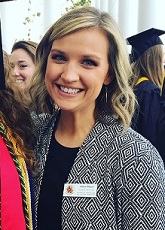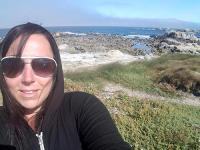 Dr. Mark Carroll, Director
Dr. Mark Carroll, Director
Dr. Carroll is an Associate Professor within the Department of Plant Science and Landscape Architecture. His research focuses on water quality issues in the management of turfgrasses and the development of low input sustainable turfgrass systems. He examines the fate of pesticides and nutrients in turf systems and investigates the development of innovative approaches that will minimize nutrient fertilization of lawns. Dr. Carroll teaches Introductory to turfgrass science and management (PLSC205) and oversees the internship program within the Department of Plant Science and Landscape Architecture. He is a popular conference speaker and a frequent organizer of workshops and symposia that address environmental issues in turfgrass management. Dr. Carroll received his B.S in Soil Science from Cal Poly State University, his M.S. in Soil Science from Michigan State University, and a Ph.D. in Turfgrass Science from Cornell University.
In his capacity as the ENSP Director Dr. Carroll teaches ENSP 400 - Capstone in Environmental Science and Policy, and a university general education Big Question course entitled Lawns in the Landscape: Environmental Hero or Villian (ENSP250). He oversees all administrative matters pertaining to the ENSP program.
Near daily smog alerts, viewing the Santa Barbara oil spill and hiking through the redwood forests of Northern California, (which he did many times), were early life experiences that molded Dr. Carroll’s appreciation of the environment and the need to manage it wisely. He enjoys hiking, fishing, gardening and following the Terps sports teams. It is easiest to reach Dr Carroll via email at mcarroll@umd.edu, or to a lesser extent, by phone at 301-405-1339.
 Ms. Angela Mazur-Gray, Assistant Director
Ms. Angela Mazur-Gray, Assistant Director
Angela joins the Environmental Science and Policy Program after serving 5 years with the College of Agriculture and Natural Resources Academic Programs Office here at the University of Maryland. She has familiarity with undergraduate advising, academic policy, educational programming, and a passion for fostering student development and engagement.
In ENSP, Angela primarily helps first- and second-year ENSP students explore and declare a concentration; she assists third- and fourth-year ENSP students with general advising issues while preparing them for internships and other professional development opportunities. She also handles some of the academic administration in ENSP and proudly serves as the advisor for ENSPire, the ENSP Student Advisory Board.
A graduate of the University of Maryland (GO TERPS!), she earned her Master’s degree in Educational Leadership and Policy Studies in 2010 and also holds a Bachelor’s degree in Education from the University of Pittsburgh.
Angela’s appreciation for the environment has run strong throughout most of her life; from biking and discovering the backwoods of Western PA at a young age to exploring the large tropic rainforests of the Yungas area during a college study abroad trip in Bolivia, these experiences have shaped the way she views the world and is most excited to help ENSP students find their passions in this field. In her spare time (which is now limited due to having a toddler), you can find Angela hiking nearby trails, travelling, exploring local coffee shops, and planning her next National Parks vacation (Zion is still her favorite!). You can reach Angela by email at abm13@umd.edu.
 Dr. Caroline Boules, Senior Lecturer
Dr. Caroline Boules, Senior Lecturer
Dr. Caroline Boules has a Ph.D. in Environmental Science and Public Policy from George Mason University, and is proud to say that she was an undergraduate at Maryland. She has a Master of International Affairs with a concentration in Environmental Policy from Columbia University, and has always been fascinated by human-environment interactions in both international and local contexts.
Dr. Boules is interested in the impact of the global on the local; in the ways that policies affect local-scale human livelihoods, cultures and behaviors, and the ways that human systems adapt to both economic and environmental changes. She is an interdisciplinary social scientist with research expertise in climate change adaptation in agricultural systems, water scarcity and water management, socio-economic vulnerability to environmental risks, sustainable livelihoods, community-based work, climate change communication, and qualitative and mixed-methods research. She is also interested in environmental and climate justice, and in the impacts of climate agreements on marginalized communities globally. She has conducted field research in Haiti, Tunisia, and on the eastern shore of Maryland.
Dr. Boules has taught courses at George Mason University and American University. At Maryland, she will be teaching ENSP400 - Capstone in Environmental Science and Policy, as well as other upper-level courses in the ENSP Program. You can reach Dr. Boules by emailing cboules@umd.edu.
 Mrs. Joanna Goger, J.D., Principal Lecturer
Mrs. Joanna Goger, J.D., Principal Lecturer
Mrs. Goger is a Principal Lecturer in Environmental Science & Policy (ENSP). She teaches ENSP 102 - Introduction to Environmental Policy, ENSP 330 - Introduction to Environmental Law, ENSP370 - Principles of Environmental Justice, and ENSP400 - Capstone in Environmental Science and Policy.
Mrs. Goger received her B.A. in History from Duke University and her J.D. from the University of Maryland School of Law, where she concentrated in Environmental Law and was an articles editor of the Maryland Law Review. After graduating from law school, Mrs. Goger clerked for U.S. District Judge Frederic N. Smalkin and went on to serve as a trial attorney in the Environment and Natural Resources Division of the U.S. Department of Justice. While there, she litigated cases involving the Florida Everglades and the Klamath River Basin in Oregon, which provide interesting case studies in her courses.
In addition to teaching in ENSP, Mrs. Goger has also taught a Biodiversity Protection seminar at the University of Maryland School of Law, and regularly advises ENSP Honors students whose topics involve environmental law. She also serves as Co-Director of the Sustainability Studies minor.
Mrs. Goger’s appreciation for the environment grows out of her love for the diverse environmental resources of the state of Maryland. She grew up hiking and camping near Frederick and now enjoys exploring the Severn River and Chesapeake Bay with family. You may contact Mrs. Goger by e-mail at jgoger@umd.edu, by calling 301.405.4104, or by leaving a message in the ENSP office.
 Dr. Annette Spivy, Senior Lecturer
Dr. Annette Spivy, Senior Lecturer
Dr. Annette Spivy received her BS in Environmental Studies from the University of Central Florida while minoring in Biology. She then went on to receive an MSc in Sustainable Development and Conservation Biology (CONS) with a focus in applied spatial ecology from the University of Maryland, College Park, where she also earned her PhD in Ecosystem Health and Natural Resources Management. Dr. Spivy always had a passion for conservation and had also developed a strong knowledge of environmental modeling, data management, and quantitative assessments of environmental change and quality (with the use of Geographical Information Systems (GIS) and select programming software).
As a contemporary scientist, Dr. Spivy relentlessly investigates the influence of humans on habitats and landscapes. She strives to answer these questions through interdisciplinary research and rigorous analysis of the relationships between people, organizations, technologies, institutions, cultures, and the environment. She believes this pragmatic approach is essential for addressing today’s environmental issues, as management and policy makers must increasingly endeavor to meet the needs of both human beings and ecological systems. Her current research specifically involves investigating the effects of sea surface temperature, sea level rise, and coastal development on marine turtle nesting sites to guide management while prioritizing conservation of nesting beaches along the South Atlantic Bight. GIS is, and will continue to be, an essential component of her work because it is a highly visual tool that fills a key role in manipulating and modeling spatial data; the use of spatial data inherently facilitates improved communication that can then lead to better decision making among a variety of stakeholders.
At Maryland, Dr. Spivy advises ENSP-Wildlife students, and teaches a number of courses, including: ENSP101 - Intro to Environmental Science and plans to teach some of the ENSP Applied Science and Policy courses for the program. You can reach Dr. Spivy by e-mailing aspivy@umd.edu.